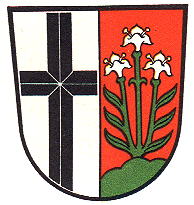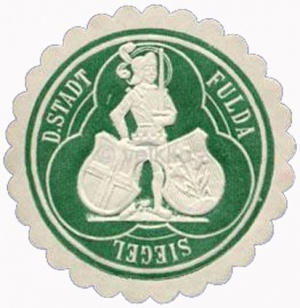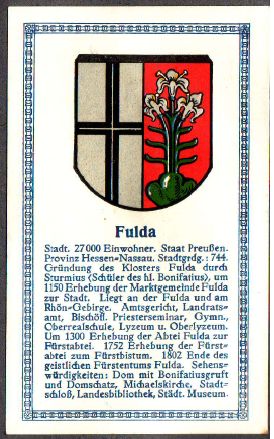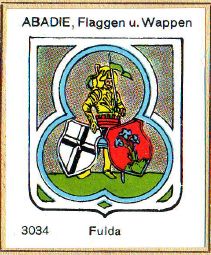Fulda: Difference between revisions
Knorrepoes (talk | contribs) m (Text replacement - "====Official blazon====" to "===Official blazon===") |
Knorrepoes (talk | contribs) m (Text replacement - "====Origin/meaning====" to "===Origin/meaning===") |
||
| Line 11: | Line 11: | ||
(de) Ein gespaltener Schild; vorne in Silber ein schwarzes, durchgehendes Kreuz, hinten in Rot ein grüner Dreiberg, aus dem eine grüne Lilienstaude mit drei silbernen Blüten herauswächst. | (de) Ein gespaltener Schild; vorne in Silber ein schwarzes, durchgehendes Kreuz, hinten in Rot ein grüner Dreiberg, aus dem eine grüne Lilienstaude mit drei silbernen Blüten herauswächst. | ||
===Origin/meaning=== | |||
The arms are a combination of the cross of the Fulda Abbey and the symbol of the patron saint of the Abbey and city, St. Simplicius. The oldest known seal of the city, which dates from the late 13<sup>th</sup> century, shows an Abbott on a throne with at his feet a shield with the three lilies rising from a hill. A later seal shows only the patron saint, and in the 17<sup>th</sup> century he was shown holding a banner with a cross. The above arms were adopted in the 19<sup>th</sup> century and combine the cross and the lilies. | The arms are a combination of the cross of the Fulda Abbey and the symbol of the patron saint of the Abbey and city, St. Simplicius. The oldest known seal of the city, which dates from the late 13<sup>th</sup> century, shows an Abbott on a throne with at his feet a shield with the three lilies rising from a hill. A later seal shows only the patron saint, and in the 17<sup>th</sup> century he was shown holding a banner with a cross. The above arms were adopted in the 19<sup>th</sup> century and combine the cross and the lilies. | ||
Revision as of 19:43, 22 June 2017
This page is part of the German heraldry portal |
Heraldry of the World |
|
German heraldry:
|
Selected collector's items from Germany:
|
FULDA
State : Hessen
District (Kreis) : Fulda
Additions : 1971/2 Bernhards, Besges, Bronnzell, Dietershan, Edelzell, Gläserzell, Haimbach, Hamerz, Istergiesel, Johannesberg, Kämmerzell, Kohlhaus, Lehnerz, Lüdermünd, Maberzell, Malkes, Mittelrode, Niederrode, Niesig, Oberrode, Rodges, Sickels, Zell, Zirkenbach
Official blazon
(de) Ein gespaltener Schild; vorne in Silber ein schwarzes, durchgehendes Kreuz, hinten in Rot ein grüner Dreiberg, aus dem eine grüne Lilienstaude mit drei silbernen Blüten herauswächst.
Origin/meaning
The arms are a combination of the cross of the Fulda Abbey and the symbol of the patron saint of the Abbey and city, St. Simplicius. The oldest known seal of the city, which dates from the late 13th century, shows an Abbott on a throne with at his feet a shield with the three lilies rising from a hill. A later seal shows only the patron saint, and in the 17th century he was shown holding a banner with a cross. The above arms were adopted in the 19th century and combine the cross and the lilies.
The combination of both first appears on a banner of the Abbey in 1300, but was never used before as arms of either the Abbey or the city.
Still, the city sometimes used two separate shields, one with the cross, the other with the lily.
| Seals of the city from around 1900. |
| |
| The arms in the Abdulla album, 1928 |
The arms in the Abadie albums |
The arms in the Emmerlinge albums |
| The arms by Hupp in the Kaffee Hag albums +/- 1925 |
The arms as shown in the 1950s. |
Contact and Support
Partners:
Your logo here ?
Contact us
© since 1995, Heraldry of the World, Ralf Hartemink 
Index of the site
Literature : Stadler, K. : Deutsche Wappen - Bundesrepublik Deutschland. Angelsachsen Verlag, 1964-1971, 8 volumes.



















